- Home
- J. Clifton Slater
Neptune's Fury Page 19
Neptune's Fury Read online
Page 19
“The court agrees,” Praetor Seubus said accepting the request.
“What happened after the Tribune left?” Imprecari inquired.
“I was preparing to follow the staff officer when Master Sisera assaulted Nardi Cocceia,” Humi testified. “In full armor, he pushed his way through the farmers petitioning Master Cocceia and attacked the mayor.”
“He was guarded by Umbria warriors,” Alerio blurted out.
“So, you admit to assailing the Umbrian headman?” Imprecari charged.
“It was the only way to get an appointment,” Alerio offered.
“Judge, I asked that this aside be included in the records,” Imprecari requested. “Specifically, where the accused admits to assaulting Nardi Cocceia.”
“I will allow it,” the Praetor instructed.
“Tell us Master Humi, what happened after Master Sisera’s uncivilized behavior?”
“He ordered me to remain in Stifone and physically kept me from meeting with the mayor or returning to the Capital,” Humi lied. “And well he should have, because I could have stopped what happened next.”
Alerio jumped to his feet and pointed a finger at Humi.
“You are a murder and a saboteur,” Alerio shouted. “It’s you who should be on trial.”
“Guards. If the accused continues his outburst,” Praetor Seubus advised. “You will tie him to the chair and gag him. Do you understand Master Sisera?”
“It’s Centurion Sisera,” Alerio corrected. “I am a Legion infantry officer and everything said so far had been twisted beyond recognition.”
“I asked you a question, Master Sisera,” the Praetor reminded him. “Do you understand me?”
Pamphilus gripped Alerio’s arm and pulled him down into the chair.
“Yes, sir. I understand,” Alerio confirmed.
“Master Humi. What did happen next?” Orator Imprecari prompted the witness.
“Sisera threatened Nardi Cocceia into supplying workers and coins,” Humi explained. “In return, Sisera promised Nardi vast rewards including citizenship in the Republic.”
“Let the records show that a carrot and stick approach was used to force a provincial into Sisera’s criminal enterprise,” Imprecari summed up the testimony. “And what did the Umbrians have to say about this travesty?”
“They couldn’t say anything. Sisera hired local thugs to keep the workers in line,” Humi replied. “In one case, a craftsman and his young helper sneaked out trying to reach Amelia and warn Nardi Cocceia.”
“What happened to the Umbrian?”
“He was found on the side of the trail shot to death by arrows,” Humi testified. “No one would say it. But we all figured it had to be Sisera who hunted and killed the carpenter and his apprentice.”
“Judge. Here sits a man who held craftsmen from an allied nation prisoner and, defrauded an entire village of the Umbria people,” Imprecari recapped. “Through the abuse of his authority as an officer of the Legion and his use of terrorist tactics, Alerio Sisera declared himself a barbarian warlord. I have no more questions for this witness.”
Pastor Pamphilus rose from his seat and stared at Humi.
“Are you an honorable man who respects the gods?” the Priest inquired.
“I honor the Republic, my fellow citizens, and my family,” Humi vowed. “And I make daily sacrifices each day at dawn to my family’s and my personal god.”
“I have no more questions,” Pamphilus stated as he sat.
“That is a tremendous defense you’re mounting,” Alerio whined. “Are you sure you aren’t a Tribune?”
“I am positive,” Pamphilus replied, missing the sarcasm in Alerio’s question.
***
“You have an idea of the crimes,” Imprecari stated. “And, now Judge, I want you to know the scope of Alerio Sisera’s treachery. I call on Lucius Trioboli to supply the details. Centurion, please introduce yourself.”
Trioboli hadn’t worn a tunic with identifiable military patches. Although he had allowed the advocate to use his Legion officer’s title. The disparity confused Alerio until Trioboli began his testimony.
“I am Lucius Trioboli, a Centurion with the Northern Legion,” Trioboli stated.
Alerio leaped to his feet and yelled, “You lie. You were never with the Northern Legion. You were with 1st Century Subausterus, an unassigned unit.”
Judge, Praetor Seubus, raised a fist in the air and ordered, “Guards. Muzzle that beast. I will not have these proceeding interrupted again.”
Alerio didn’t notice the smug look on Humi’s face or the satisfied gleam in Trioboli’s eyes. Centurion Sisera was too busy being thrown to the ground. Once down, the guards tightened a cloth around his head that cut into his mouth. When both wrists were tied together, he was lifted and dropped onto his chair. By then, Humi got control, and put a neutral expression on his face.
“Please continue,” Orator Imprecari urged.
“We received word from Master Humi about the troubles in Stifone,” Trioboli described. “We always tread carefully in Umbria territory. They are allies of the Republic. We arrived late in the day and Master Humi asked my opinion of a ship under construction. I’m a supply officer by training and have experience with construction projects.”
“And what did you find?” Imprecari questioned.
“From what I could tell in the afternoon light, it was a quality mockup of a trireme,” Trioboli responded. “Fearing Sisera would destroy the fake ship-of-war, I posted four Legionaries to guard it overnight. That was a mistake, I’ll live with for the rest of my life.”
Trioboli sagged, squeezed the bridge of his nose and, closed his eyes.
“Take a moment to compose yourself,” Imprecari counselled. “Then tell the court why you are so emotionally distraught.”
Alerio gnawed on the gag but resisted pounding his hands on the table. Finally, Trioboli exhaled and squared his shoulders.
“In the morning, I found all four Legionaries dead. Sometime in the night, they had been brutally clubbed to death,” Trioboli stammered, his emotions almost getting the better of him. “They were good lads from good families. I blame myself for their deaths.”
“No Centurion Trioboli, it isn’t you who murdered the Legionaries,” Imprecari assured him. The Orator spun in the direction of the defendant’s table, raised an arm, and pointed at Alerio. “The responsibility for the deaths of four, fine young men, falls on that rogue, Alerio Sisera. But, back up Centurion Trioboli. Where was the accused when you arrived that morning?”
“Under cover of night, Sisera and his confederates launched the replica ship,” Trioboli informed the court. “Clearly, he took the trireme to prevent me from documenting the irregularities in construction.”
“Thank you Centurion Trioboli, I have no more questions,” Imprecari said.
Pamphilus half stood while leaning with his arms pressing on the tabletop.
“Master Trioboli, what’s the first act when you receive a shipment of vino,” the Priest asked.
“You count and record the number of amphorae,” Trioboli responded.
“Thank you,” Pamphilus said before sitting down.
“An interesting line of questioning,” Orator Imprecari suggested. Then he turned to the man with the pouch full of scrolls. “Pease stand and state your name.”
“I am Libitus Belivum, a Quaestor for the city of Rome,” he answered.
The Quaestor’s were the basic level of magistrates. They oversaw the Republic’s treasury and conducted audits of companies and estates owing the government taxes or payments. If a Legion Tesserarius collecting road taxes and keeping a Century’s books was at the bottom, a Quaestor sat at the top of the accounting ladder.
“You have heard the proceedings,” Imprecari stated. “Tell us the amount, in coins, of damage done to the Republic by Sisera’s activities.”
“I have reviewed the bills of laden,” Belivum reported. “They total one million, eighty-eight thousand, one hundre
d seventy-three silver coins owed to the Umbrian, Nardi Cocceia.”
“Is there a slave worth that?” Imprecari inquired. “Or a set of armor, or a Centurions pay that could be docked to repay that enormous figure?”
Behind the gag, Alerio swallowed. He knew the point being made by the Orator.
“Of course not,” Quaestor Belivum assured him. “You’re talking about a capital expenditure. That sum would be used for building villas and ships, bridges, miles of roadway and aqueducts.”
“Thank you, Quaestor,” Imprecari said with a slight bow at the waist. Before sitting, he added. “I have no further questions.”
Pastor Pamphilus didn’t bother to stand. From his chair, he asked Quaestor Libitus Belivum, “Do you have plans for the future? Ones that include being elected to the position of Praetor or maybe even Senator?”
“I do,” Belivum replied.
“I have no more questions,” Pamphilus said.
Imprecari raised slowly while elevating his arms. By the time he was erect, his hands were high overhead.
“I feel as if I am drowning in corruption,” he announced. “From murder, to theft, to broken trusts, to the destruction of treaties. And trade agreements ground under the hobnailed bootheel of one man.”
Lowering his arms, the Orator turned his back to Alerio.
“A trusted Centurion sent to give military advice sees an opportunity,” Imprecari bellowed. “A chance for ill-gotten gains, a prospect honorable men would ignore but, a lure that Alerio Sisera could not resist. The monster grabbed coins and supplies with both greedy hands until he had stolen a fortune. And, left a border in crisis and near war. But what does the death of good men mean to such an animal? Nothing. And so, I ask in the name of the Republic, for a sentence of death. The Republic rests its case.”
Imprecari sat slowly as if exhausted while Pamphilus shot to his feet as if excited.
“Master Humi. You said you sacrifice to your god and your family’s every morning. But you didn’t this morning. And yet, you failed to call on your personal god for forgiveness for missing the day,” Pamphilus informed him. “Are you normally given to lying in a court set in a temple. Or is it just in the case of Alerio Sisera?”
“I don’t know what you are talking about,” Humi stammered. “Why would I lie? Why?”
“I don’t know but I suggest you consult a temple priest for guidance,” Pamphilus offered before nodding in Trioboli’s direction. “Centurion. When queried, you stated the first thing a supply man does when receiving a shipment of vino is count the amphorae. In fact, the first thing every supply man does is check the quality of the items to be sure he is receiving what was ordered. Are you incompetent or given to flights of imagination when telling untruths?”
“I don’t have to reply to that,” Trioboli countered.
“Of course, you don’t,” Pamphilus acknowledged. “Just as you didn’t have to tell the court what really happened in Stifone. Judge, I submit that the witnesses lied for unknown reasons. You need to hear from Alerio Sisera in order to balance the testimony.”
Alerio was impressed by the Priest’s common-sense approach to the law. He waited for the gag to come off so he could tell his side of the story.
“Request denied. Take the prisoner out,” the Judge declared. He looked away from Alerio and focused on the Fetial Priest. “Brother Azeglio, I require your consultation.”
The guards plucked Alerio out of the chair. They pulled the gag and untied his hands then, before he could voice a protest, quick marched him from the amphitheater. They retraced their steps through the alleyway and turned at the colonnade. Just before the trio reached the holding room, Alerio caught a glimpse of a familiar figure. Tribune Subausterus ducked out of sight between columns on the other side of the temple’s quad.
“Not fast enough,” Alerio said with a laugh.
He pledged when this was over, he would find a way to get revenge on the nobleman. Then the door opened and a wave of aromas rolled over him. As he stepped into the room, the sight of a feast greeted his eyes while the delicious smells made his mouth waters.
Unfortunately, it was all solid, heavy food.
Chapter 27 - The Fatal Half Mile
People uninitiated in the ways of war or those more sensitive to their fate might be sick to their stomachs. Mentally crushed by the circumstances, they would find it impossible to eat.
For an infantryman, the meal before a battle always tasted like hope. As if the ritual of eating extended the day, pushing the conflict further away. And the flavor of each bite was relished as it heightened the thrill of being alive in the moment. Not as important, or as sought after, as the meal after a battle that confirmed the Legionary survived. But, enjoying a meal prior to facing death always seemed to leave an opening for a future.
Alerio, as an infantryman, poured a mug of vino and circled the spread of dishes. Despite the ominous meaning of the banquet, Centurion Sisera exclaimed, “Bless me, Bacchus. This feast will not go to waste.”
The banquet offered slices of roast and beef in sauces; slices of ham and pork in sauces; and slices of chicken and fowl in sauces. Absent were greenery, fruits, vegetables or anything light. Conversely, the temple provided breads made from a variety of grains, plus pies, and honey cakes. The pitcher of dark red, un-watered, vino confirmed this solid, heavy meal was a last supper.
Alerio sipped, filled a platter, and carried the drink and food to a sofa. With the platter on a side table, he reclined and began to eat. It tasted like hope.
The strip of morning sunlight came through the east slit and splashed color across the floor tiles on the west side of the room.
***
Alerio napped, woke, refilled the platter and the mug, and sat consuming more of the feast. The idea of a plan half formed in his mind. Then, filled with vino, delicious food, and hope, Alerio Sisera drifted off.
The two guards were smashed to the ground and the Priest shoved aside. Alerio apologized to the holy man as he ran from the room. Although he didn’t know the temple complex, as a bold outlaw, Alerio sprinted, jumped, and knocked a passing visitor from his mount. Then, sitting astride the stolen horse, he rode at a breakneck pace down to the Strait of Messina. After braving the dangerous currents of the strait, Alerio presented himself in the town of Messina. There, he claimed his title as a Captain in the Sons of Mars. His prior life forgotten, Alerio flourished as the dashing commander of a pirate vessel.
The strip of light vanished while the sun transitioned across the sky. Later in the day, the sunlight entered from the west slit and reflected off the tiles on the east wall of the room.
***
“Alerio Sisera, prepare yourself,” Pastor Pamphilus stated while opening the door.
Still half asleep, Alerio reached to the small of his back and touched the Golden Valley dagger.
Six temple guards flowed in from behind the Priest and Alerio’s hand stopped. The guards spread out and leveled their spears.
“Your days of fighting are over, Centurion,” Pamphilus offered. “Use the rest of your life to make peace with your personal god.”
“Goddess,” Alerio said softly, letting his hand drop from the small of his back. He stood and straightened the tunic. “My personal deity is a Goddess.”
“Usually, I think of Legionaries as being closer to Gods,” Pamphilus admitted. “But I understand. I will make a sacrifice for you at dusk. Which Goddess is it? Athena for war, Bia for bodily strength, Pietas for duty, Spes for hope, or Victoria for success?”
“You are a good man, Pastor Pamphilus,” Alerio told him. “Make the sacrifice a worthy one Priest, for it is offered to Nenia, the Goddess of death. You can chant to her if you like. She enjoys that.”
Pamphilus cringed and his power of speech fled. Not because Alerio named the goddess who lifted souls from bodies near death, but from the man’s casual familiarity with the shadowy Nenia.
“I haven’t the voice for chanting,” Pamphilus admitted after r
ecovering. “But the sacrifice will be adequate.”
“Make it exceptional,” Alerio instructed while handing a small purse of coins to the Priest. Then he cuffed and pulled the dagger from the small of his back. “This needs to be returned to the Golden Valley trading house.”
Holding the blade under his wrist and out of sight of the guards, Alerio slipped the dagger into Pamphilus’ hands.
“That is not a donation to the Temple of Jupiter,” Alerio warned. “The blade has a death curse on it. Only by returning it to the Golden Valley can one avoid dying violently.”
“For one so young,” Pamphilus observed. “you seem to have a strong affiliation with death.”
“Ever since my actions at a terribly sad pub in a backwater grain collection town,” Alerio replied. “Death has been my companion. I’m ready.”
Three guards filed out of the room, followed by Alerio and Pamphilus, and finally the last three temple guards. The sentries formed a moving diamond formation around the convicted and the priest.
“You would think a man could get a ride to his fate,” Alerio commented. He rotated his face feeling the warmth of the late afternoon sun.
“It’s only a half mile to the Tarpeian Rock,” Pamphilus remarked. “I thought you would enjoy the walk. If you like, I’ll call for the cart.”
“No, I was thinking of a stallion,” Alerio teased. “It’s not the half mile walk. It’s the last eighty feet down to the rock that interests me.”
“You do have an odd association with death,” Pamphilus said.
“Yes, I do, Priest,” Alerio confirmed.
***
Praetor Valerius Seubus and Scribe Convelli stood near, but not too close, to the edge of the cliff. In a cluster facing the Judge were the witnesses to the execution.
The Quaestor, Libitus Belivum, and the Fetial brother, Azeglio, maintained serious expressions and kept their own counsel with their heads held high. That ran counter to Humi and Trioboli. Their heads were down and they whispered excitedly to each other.
When the condemned and the priest appeared on the road from the temple, the official and the witnesses turned to face the procession. But Alerio and Pamphilus’ nonchalant stroll took so long that when they reached the area of the cliff, the witnesses were shuffling their feet and Humi yawned.

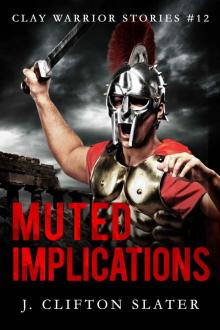 Muted Implications (Clay Warrior Stories Book 12)
Muted Implications (Clay Warrior Stories Book 12)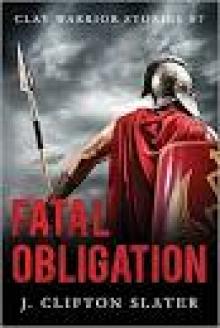 Fatal Obligation
Fatal Obligation Clay Warrior Stories Boxset 2
Clay Warrior Stories Boxset 2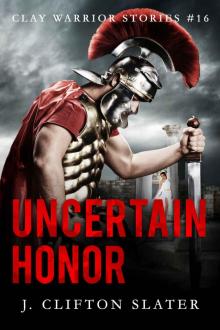 Uncertain Honor
Uncertain Honor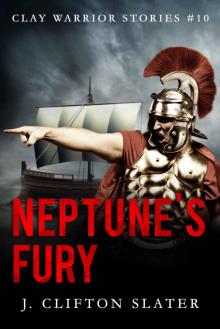 Neptune's Fury
Neptune's Fury Fortune Reigns
Fortune Reigns Op File Treason
Op File Treason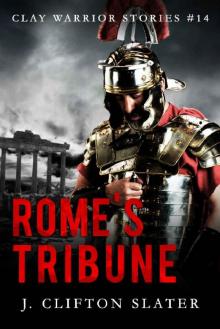 Rome's Tribune (Clay Warrior Stories Book 14)
Rome's Tribune (Clay Warrior Stories Book 14) Clay Warrior Stories Boxset 1
Clay Warrior Stories Boxset 1 Serpent Circles
Serpent Circles Reluctant Siege
Reluctant Siege Infinite Courage
Infinite Courage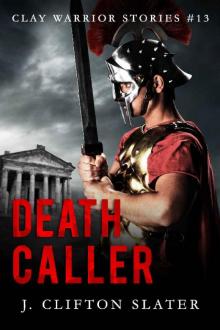 Death Caller (Clay Warrior Stories Book 13)
Death Caller (Clay Warrior Stories Book 13) Op File Sanction
Op File Sanction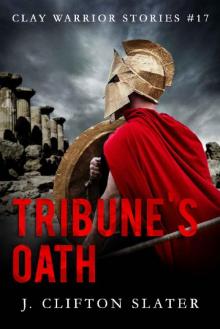 Tribune's Oath (Clay Warrior Stories Book 17)
Tribune's Oath (Clay Warrior Stories Book 17) Galactic Council Realm 1: On Station
Galactic Council Realm 1: On Station Brutal Diplomacy
Brutal Diplomacy Op File Revenge
Op File Revenge On Point
On Point Bloody Water (Clay Warrior Stories Book 3)
Bloody Water (Clay Warrior Stories Book 3)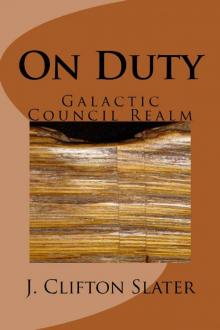 Galactic Council Realm 2: On Duty
Galactic Council Realm 2: On Duty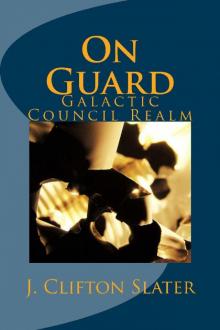 Galactic Council Realm 3: On Guard
Galactic Council Realm 3: On Guard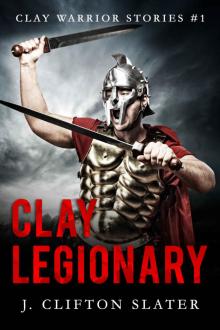 Clay Legionary (Clay Warrior Stories Book 1)
Clay Legionary (Clay Warrior Stories Book 1) On Point (Galactic Council Realm Book 4)
On Point (Galactic Council Realm Book 4) Op File Revenge (Call Sign Warlock Book 1)
Op File Revenge (Call Sign Warlock Book 1)